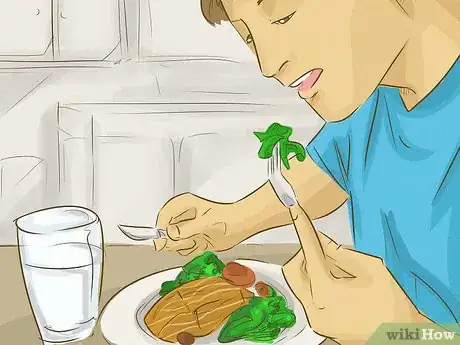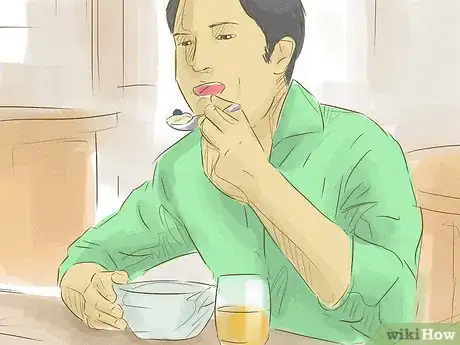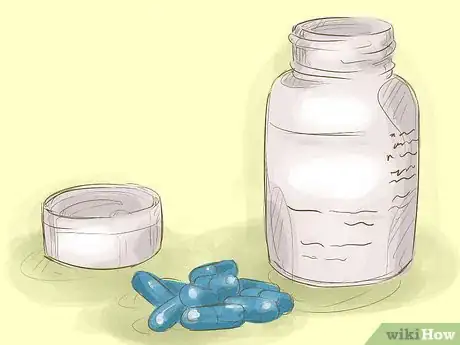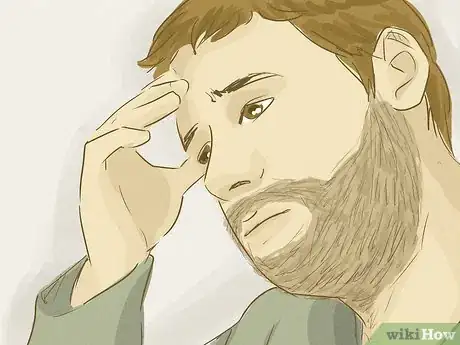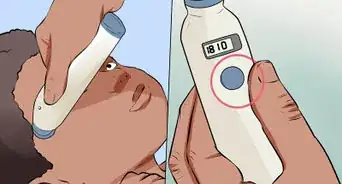This article was co-authored by Marc Kayem, MD. Dr. Marc Kayem is a board certified Otolaryngologist and Facial Plastic Surgeon based in Beverly Hills, California. He practices and specializes in cosmetic services and sleep-related disorders. He received his Doctorate in Medicine from the University of Ottawa, is board certified by the American Board of Otolaryngology, and is a Fellow of the Royal College of Surgeons of Canada.
There are 16 references cited in this article, which can be found at the bottom of the page.
This article has been viewed 39,452 times.
If you're feeling worn-out, weak and weary you may be suffering from fatigue. This is a common problem which may be caused by many things, including lack of sleep, stress, poor diet, dehydration, and obesity. In most of these cases, fatigue can easily be dealt with - it's just a matter of taking better care of yourself. However, sometimes fatigue is a symptom of a more serious underlying issue and will require medical attention. Start with Step 1 below for some helpful information on how to boost your energy levels (and overall health) and kick fatigue to the curb!
Steps
Making Positive Lifestyle Choices
-
1Increase your physical activity. Even though it's the last thing you feel like doing when you're tired and out of energy, getting frequent exercise is one of the most effective ways to overcome fatigue. Study after study has shown that people who exercise regularly are more active, energetic and, in general, healthier than those who don't.[1]
- You don't need to slog it out on the treadmill for an hour to enjoy the benefits of exercise - find an activity you enjoy that still gets your body moving - try a dance class, take up martial arts, or go on a bike ride with a friend.
- Not only does exercise make you more energetic, it increases your overall health by strengthening the heart, lungs and muscles. It also makes you happier, as it triggers your body's production of "happy hormones" called endorphins.
- Yoga is believed to be a particularly effective form of exercise for reducing fatigue. This is due to the fact that yoga, thanks to its calming, meditative nature, can increase mental energy in addition to physical energy levels.[2]
-
2Reduce stress. Stress, anxiety and negative emotions in general can be a major sap on your energy levels. Therefore, in order to effectively fight fatigue, you will first need to minimize your stress levels.[3]
- If your stress tends to come from the workplace, see if you can delegate some of your heavy workload to your colleagues, or consider switching to more laid-back job.
- If your stress comes from a demanding or difficult partner, sit them down and discuss what your needs are within the relationship - if he/she can't agree, consider taking a break and reassessing whether you want to be in this relationship.
- Sometimes stress stems from a lack of "me time". If you feel this is the case, then make some time for yourself. Take up an activity like yoga or meditation which will help to clear your mind and reduce stress. If that's not your thing, just having a relaxing bath or spending time with friends and family can be enough.[4]
-
3Drink more water. Dehydration is a common cause of fatigue and low energy levels, in addition to poor concentration. Without enough water in your system, blood flow to the essential organs (including the brain) is reduced, thus slowing them down.[5]
- Therefore, one easy step you can take to fight fatigue is just to drink more water every day. Although 6 to 8 glasses a day is a good guideline, it's also important to listen to your body.
- One way to tell if you are dehydrated is to look at the color of your urine. If you are adequately hydrated, it should be a pale yellow or straw colored. If it's any darker, you are dehydrated.[6]
- You can also increase your water intake by drinking herbal teas and eating fruit and veg with a high water content, such as tomatoes, cucumbers, lettuce, watermelon and beets.
-
4Quit smoking. In general, smokers tend to have less energy than their non-smoking counterparts. Cigarettes contain an abundance of harmful substance which affect your overall health and wellness.[7]
- More specifically, your body needs to combine oxygen with glucose in order to make energy, but the carbon monoxide in cigarettes depletes your body's oxygen levels, making it harder to produce energy.[8]
- Therefore, if you're a frequent smoker who struggles with fatigue, your first step should be to quit smoking. It won't be easy, but your body will thank you for it! Find some helpful tips on how to quit smoking here.
-
5Cut back on alcohol intake. Although you may feel that having a glass of wine or beer in the evening helps you to unwind or maybe even fall asleep, it can actually leave you feeling more tired the next day.[9]
- This is due to the fact that alcohol prevents you from falling into a deep sleep, which leaves you feeling groggy and unrefreshed when you wake up, even if you had a full 8 hours sleep.
- Therefore, you should aim to cut back on nighttime drinking, and limit your alcohol consumption to 3-4 units per day for men and 2-3 units a day for women.[4]
-
6Lose weight. If you're carrying around an extra few pounds, you can find yourself feeling sluggish and drained of energy. Simply by losing a little bit of weight, you can increase your energy levels and improve your mood and quality of life.[10]
- Make sure you lose weight safely and healthily - you can do this by cutting back on your portion sizes (using smaller plates helps), eating a balanced diet, cutting out high sugar and high fat foods and getting plenty of exercise.
- It's very important that you avoid crash dieting, as this can leave you feeling more fatigued than before. This is due to the fact that low-carb and other strict diets don't provide enough energy for your body's needs, in addition to depriving the body of important vitamins and nutrients.[2]
Getting Better Sleep
-
1Get at least 7 hours sleep a night. It may seem fairly obvious, but if you're suffering from fatigue, the first and foremost step is to ensure that you are getting enough sleep every night.[11]
- It's estimated that two-thirds of people experience sleep problems at some point in their lives, and these sleep problems negatively affect their energy levels, mood and work performance the next day.[4]
- Therefore it's important that you go to bed at a reasonable hour, to ensure that you get at least 7, and ideally 8 hours sleep per night.
- If you have trouble getting to sleep (no matter how tired you are), there are several adjustments you should make to your night-time routine.
-
2Stick to a sleeping schedule. Aside from getting enough sleep, it's important that you try to go to sleep and wake up at approximately the same time every day (even on weekends).[12]
- This helps to set your body clock to a regular schedule - for example, if you go to bed at 10 pm and wake up at 6 am every day, your body will soon adjust to and accept this new schedule and you will naturally feel sleepy at 10 and awake and refreshed at 6.
- However, if you follow an erratic sleeping schedule - waking up and going to bed at a different time each day - your body will be out of sync and you may have difficulty falling asleep at night and a hard time staying awake during the day.
-
3Make sure your room is comfortable. It's also important to make sure that your bedroom is a comfortable, relaxing space where sleep is the main focus.[13]
- Ensure that the temperature is comfortable for sleeping in - not too hot or not too cold. Invest in a fan or just open a window if your room is stuffy, as sleeping in a hot room is not conducive to good sleep.
- Try to eliminate all sources of light - the window, electric lights and any blinking or LED lights on alarm clocks, televisions, or other electrical devices. If you don't want to turn them off, just cover them with a thick cloth.
- Reduce noise levels as much as possible.Close your bedroom door and ask anyone still awake to keep the television/music turned down. If you find it difficult to drown out noise from the street, consider buying a white noise machine or just play some ambient music.
-
4Don't drink caffeine for at least 5 hours before bed. Although a cup of coffee here and there can certainly help you to fight fatigue throughout the day, drinking too much or drinking it too close to bedtime can negatively impact your sleep.[14]
- Some people don't realize the effects that caffeine has on their sleep quality and generally energy levels. To figure it out, try slowly cutting coffee and other caffeinated drinks (black tea, cola and energy drinks) from your diet over a three week period to see if you notice any increase in your energy levels.
- Even if you seem to have a high tolerance for caffeine and are not keen on the idea of giving up your morning coffee, it's a good idea to stop drinking any caffeinated drinks at least 5 hours before bedtime. Switch to decaffeinated versions instead.[4]
-
5Avoid using technology before bed. Although it seems like a nice idea to watch television, play a computer game or surf the net on your laptop or iPad to unwind before bed, these activities can actually do more harm than good.[15]
- The bright lights produced by these devices actually trick the brain into believing it's daytime, which prevents your body from producing the hormones (notably melatonin) responsible for inducing sleep.
- In addition, watching action, thriller or horror movies/TV shows right before bed gets your heart racing, stimulating the body and brain and making sleep impossible.
- Therefore, you should make an effort to switch off all technological devices at least an hour before bed and partake in a more relaxing activity instead. Try reading a book (although not from a backlit e-reader), meditating or listening to music.
-
6Take a warm bath. Taking a warm bath before bed is believed to be very effective at inducing sleep, for two main reasons:
- Firstly, a hot bath helps you to relax and forget about the stresses and worries of the day - worries which are often responsible for keeping you awake at night. Secondly, the rise in body temperature (when you're in the bath) followed by the rapid drop (when you get out) mimics the body-cooling hormones your brain releases when you fall asleep.[16]
- Take a bath for at least 20 to 30 minutes before bed, and try to ensure that the water temperature is at least 100 degree F, or as hot as you can handle without scalding yourself! Keep in mind that a hot bath is not recommended for people with diabetes, gynecologic problems, low blood pressure, heart failure, varicose veins as well as during pregnancy.
- Add some aromatic essential oils, such as lavender or chamomile to the water, light some candles and play some soothing music for extra relaxation value!
-
7If necessary, take a nap. If you're really feeling exhausted throughout the day, consider taking a short nap, as it can really work wonders for your energy levels. Keep it short and sweet through - 10 minutes to 30 minutes, max.
- If you nap for too long, you may wake up feeling groggy and have difficulty sleeping that night. A short power nap, however, can boost energy levels and leave you feeling more awake and productive.
- Also try following up your nap with a small cup of coffee and a quick snack for an added energy boost.
Improving Your Diet
-
1Make healthy food choices. Eating a balanced, healthy diet will provide you with more energy and prevent you from feeling sluggish and fatigued.
- Therefore, you should increase the amount of healthy foods like fruit, vegetables, whole grains, low-fat dairy products and lean meats in your diet.
- On the other hand, you should reduce your intake of not-so-healthy foods such as those with a high salt, high sugar or high fat content.[8]
-
2Eat iron-rich foods. Fatigue is sometimes caused by anemia, which is a red blood cell deficiency often caused by a lack of iron in the diet.[17]
- Eating more iron-rich foods can help to restore the levels of red blood cells in your system, so try to eat more lean meat, tofu, shellfish, beans and seeds.
- Alternatively, you could take an iron supplement, but speak to your doctor about this first.
-
3Eat Omega-3s. Eating omega-3 fatty acids has been shown to boost alertness and increase energy levels, in addition to numerous other healthful benefits.
- Human bodies do not produce omega-3 naturally, so it's important to include omega-3 food in your diet. You can do this by eating fatty fish such as salmon, mackerel and tuna.
- If you're not a fish fan, you can also find omega-3s in walnuts and flaxseeds, or you could take a fish oil supplement.[18]
-
4Don't skip meals or overeat. Your energy levels are closely linked to your blood sugar levels, which may spike or fall as a result of overeating or under eating.[19]
- Overeating will cause your blood sugar levels to spike, which may drain your energy and leave you feeling sleepy. Instead of eating three large meals a day, try eating six mini meals in order to spread your energy intake evenly over the day.
- Under eating or skipping meals over the course of the day will cause your blood sugar levels to dip, leaving you feeling weak and out of energy. Always eat breakfast (even a cereal bar is better than nothing) and snack on a piece of fruit or low-fat yogurt when you feel peckish.
Dealing With Health Issues
-
1Be careful with medications. Certain medications may cause drowsiness and fatigue. These include:
- Antihistamines, diuretics and many blood pressure medications, amongst others.
- If you think your medication may be causing fatigue, speak to your doctor. He/she they may be able to switch your medication to a non-drowsy alternative.[2]
-
2Cope with depression-related fatigue. Sometimes fatigue is related to depression - either because the fatigue is a symptom of depression or because the depressed person finds themselves unable to sleep.
- If you feel depressed, speak to a doctor and know that several effective treatment options exist, such as counselling or cognitive behavior therapy.[20]
-
3See a doctor if you believe your fatigue may be a symptom of an underlying issue. Fatigue is sometimes just a symptom of a more serious underlying issue, such as diabetes, thyroid disease, sleep apnea, arthritis and heart disease.[21]
- If you think this might be the case, or notice any other symptoms, speak to your doctor immediately.
- The sooner these issues are diagnosed, the sooner they can be treated.[2]
Expert Q&A
-
QuestionWhy do I feel fatigued all the time?
 Marc Kayem, MDDr. Marc Kayem is a board certified Otolaryngologist and Facial Plastic Surgeon based in Beverly Hills, California. He practices and specializes in cosmetic services and sleep-related disorders. He received his Doctorate in Medicine from the University of Ottawa, is board certified by the American Board of Otolaryngology, and is a Fellow of the Royal College of Surgeons of Canada.
Marc Kayem, MDDr. Marc Kayem is a board certified Otolaryngologist and Facial Plastic Surgeon based in Beverly Hills, California. He practices and specializes in cosmetic services and sleep-related disorders. He received his Doctorate in Medicine from the University of Ottawa, is board certified by the American Board of Otolaryngology, and is a Fellow of the Royal College of Surgeons of Canada.
Sleep Specialist There are a lot of things that can contribute to that. If people are feeling fatigued and tired all the time and don't have an explanation, if it's not because of lack of sleep, then they would really need to have a full physical. There are multiple issues that could be causing it: a low thyroid can do it, anemia can do it, stress can do it, cancer can do it. There are just so many things that can cause chronic fatigue, including one called chronic fatigue syndrome, where there's just no explanation for it and everybody gets kind of put into this bag diagnosis. If you don't know why you're fatigued all the time, go talk to a doctor and get an exam.
There are a lot of things that can contribute to that. If people are feeling fatigued and tired all the time and don't have an explanation, if it's not because of lack of sleep, then they would really need to have a full physical. There are multiple issues that could be causing it: a low thyroid can do it, anemia can do it, stress can do it, cancer can do it. There are just so many things that can cause chronic fatigue, including one called chronic fatigue syndrome, where there's just no explanation for it and everybody gets kind of put into this bag diagnosis. If you don't know why you're fatigued all the time, go talk to a doctor and get an exam. -
QuestionHow do you fix adrenal insufficiency?
 Damaris Vega, MDDr. Damaris Vega is a board certified Endocrinologist. She graduated Magna Cum Laude from the Pontifical Catholic University of Puerto Rico with a BS in General Science and subsequently earned an MD from the Ponce School of Medicine, Ponce, PR. During medical school, Dr. Vega served as president of the Alpha Omega Alpha Medical Honor Society and was selected as her school's representative for the American Association of Medical Colleges. She then completed a residency in Internal Medicine and a fellowship in Endocrinology, Diabetes, Mineral, and Metabolism at The University of Texas Southwestern Medical School. Dr. Vega has been recognized for excellent patient care multiple times by the National Committee for Quality Assurance and received the Patients' Choice Award in 2008, 2009, and 2015. She is a fellow of the American College of Clinical Endocrinologists and is an active member of the American Association of Clinical Endocrinologists, the American Diabetes Association, and the Endocrine Society. Dr. Vega is also the founder and CEO of Houston Endocrinology Center as well as a principal investigator for multiple clinical trials at Juno Research, LLC.
Damaris Vega, MDDr. Damaris Vega is a board certified Endocrinologist. She graduated Magna Cum Laude from the Pontifical Catholic University of Puerto Rico with a BS in General Science and subsequently earned an MD from the Ponce School of Medicine, Ponce, PR. During medical school, Dr. Vega served as president of the Alpha Omega Alpha Medical Honor Society and was selected as her school's representative for the American Association of Medical Colleges. She then completed a residency in Internal Medicine and a fellowship in Endocrinology, Diabetes, Mineral, and Metabolism at The University of Texas Southwestern Medical School. Dr. Vega has been recognized for excellent patient care multiple times by the National Committee for Quality Assurance and received the Patients' Choice Award in 2008, 2009, and 2015. She is a fellow of the American College of Clinical Endocrinologists and is an active member of the American Association of Clinical Endocrinologists, the American Diabetes Association, and the Endocrine Society. Dr. Vega is also the founder and CEO of Houston Endocrinology Center as well as a principal investigator for multiple clinical trials at Juno Research, LLC.
Board Certified Endocrinologist In most cases, you'll need a steroid medication. I suggest you talk to your doctor to figure out which option will be best for you.
In most cases, you'll need a steroid medication. I suggest you talk to your doctor to figure out which option will be best for you. -
QuestionIf those things don't work for me what can I do?
 Carrie Noriega, MDDr. Noriega is a Board Certified Obstetrician & Gynecologist and medical writer in Colorado. She specializes in women’s health, rheumatology, pulmonology, infectious disease, and gastroenterology. She received her MD from the Creighton School of Medicine in Omaha, Nebraska and completed her residency at the University of Missouri - Kansas City in 2005.
Carrie Noriega, MDDr. Noriega is a Board Certified Obstetrician & Gynecologist and medical writer in Colorado. She specializes in women’s health, rheumatology, pulmonology, infectious disease, and gastroenterology. She received her MD from the Creighton School of Medicine in Omaha, Nebraska and completed her residency at the University of Missouri - Kansas City in 2005.
Board Certified Obstetrician & Gynecologist If you are feeling overly fatigued with your pregnancy and have not been able to find relief from life style changes, then you should talk with your doctor. If poor sleep is the cause of your fatigue, your doctor may be able to recommend safe medications to use during pregnancy to improve your sleep. Certain medical conditions may also worsen fatigue during pregnancy and you may need to undergo testing for these conditions.
If you are feeling overly fatigued with your pregnancy and have not been able to find relief from life style changes, then you should talk with your doctor. If poor sleep is the cause of your fatigue, your doctor may be able to recommend safe medications to use during pregnancy to improve your sleep. Certain medical conditions may also worsen fatigue during pregnancy and you may need to undergo testing for these conditions.
Warnings
- Do not drink too much hunger suppressants more than what is indicated.⧼thumbs_response⧽
- Never engage in fasting sessions.⧼thumbs_response⧽
- Never drink too much caffeine just to fight fatigue.⧼thumbs_response⧽
- Never self-medicate.⧼thumbs_response⧽
- Seek a fitness expert to show you how to do the exercise to avoid injury.⧼thumbs_response⧽
References
- ↑ https://well.blogs.nytimes.com/2008/02/29/the-cure-for-exhaustion-more-exercise/
- ↑ 2.02.12.22.3http://www.webmd.com/balance/features/get-energy-back
- ↑ https://www.psychologytoday.com/us/blog/quiet-your-mind-and-get-sleep/201501/11-ways-fight-fatigue
- ↑ 4.04.14.24.3http://www.nhs.uk/Livewell/tiredness-and-fatigue/Pages/self-help-energy-tips.aspx
- ↑ https://www.fitnessmagazine.com/health/energy-boosters/tips/energy-drainers-fixes/
- ↑ https://www.webmd.com/a-to-z-guides/dehydration-adults#1
- ↑ https://www.nhs.uk/live-well/quit-smoking/
- ↑ 8.08.1https://www.betterhealth.vic.gov.au/health/ConditionsAndTreatments/fatigue-fighting-tips
- ↑ https://www.health.harvard.edu/mind-and-mood/alcohol-and-fatigue
- ↑ https://www.medicalnewstoday.com/articles/248002.php
- ↑ https://www.sleepfoundation.org/articles/how-much-sleep-do-we-really-need
- ↑ https://www.sleepfoundation.org/articles/how-much-sleep-do-we-really-need
- ↑ https://www.sleepfoundation.org/excessive-sleepiness/support/how-much-sleep-do-we-really-need
- ↑ http://sleepeducation.org/news/2013/08/01/sleep-and-caffeine
- ↑ https://www.sleepfoundation.org/excessive-sleepiness/support/how-much-sleep-do-we-really-need
- ↑ https://www.ncbi.nlm.nih.gov/pubmed/9322266
- ↑ https://www.mindbodygreen.com/articles/foods-high-in-iron
- ↑ http://www.webmd.com/diet/healthy-kitchen-11/omega-fatty-acids
- ↑ https://www.piedmont.org/living-better/what-happens-to-the-body-when-you-skip-meals
- ↑ http://www.medicalnewstoday.com/articles/8877.php
- ↑ Marc Kayem, MD. Sleep Specialist. Expert Interview. 24 October 2019.
About this article
One way you can fight fatigue is by increasing your physical activity through an exercise like dancing, biking, or jogging. Exercise might feel like the last thing you want to do when you’re tired, but people who exercise regularly are more active and energetic. Another way to increase your energy is to keep yourself hydrated by drinking 6 to 8 glasses of water every day. If you’re not sure whether or not you’re dehydrated, take a look at your urine. Straw-colored urine means you’re hydrated, while darker urine means you need to drink some water. Another great way to fight fatigue is to reduce your stress levels. Consider carving out some “me time” in your schedule to do yoga, meditate, or just spend some time with friends. For more help, including how to get yourself on a strict sleeping schedule, read on!



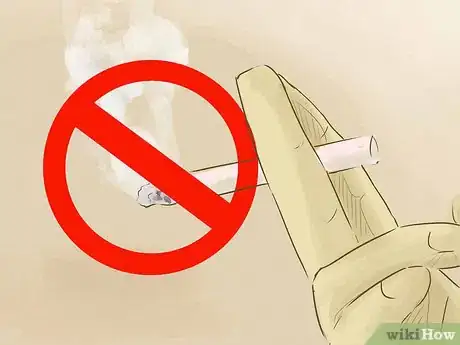

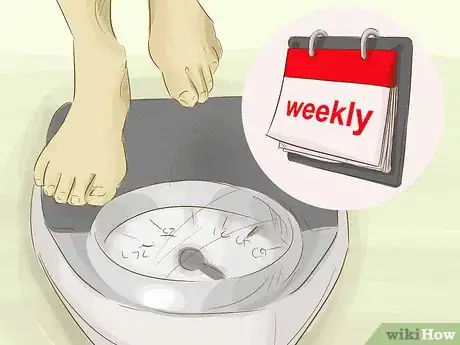
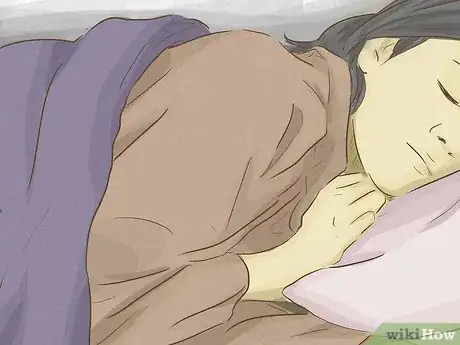
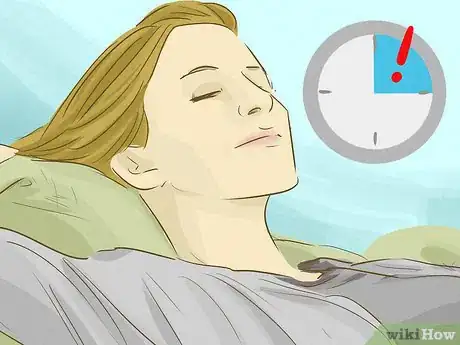
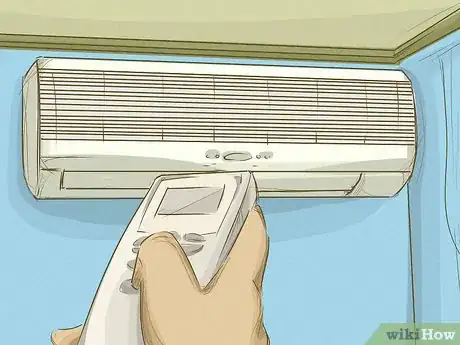
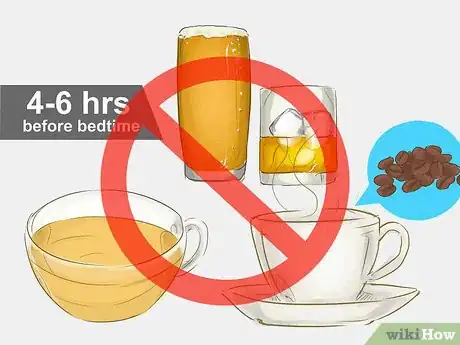
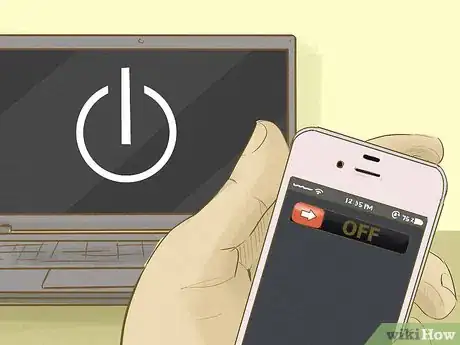

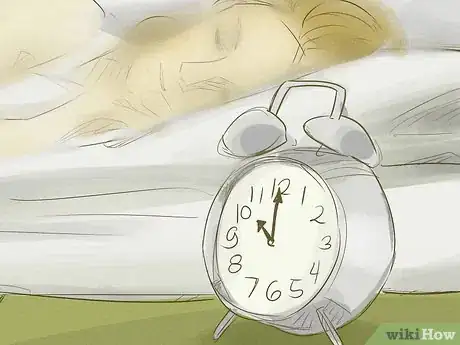

-Step-8-Version-3.webp)
